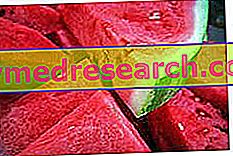Utilities and dangers
Diuretic foods have nothing to do with weight loss products, much less with antihypertensive drugs (used to lower blood pressure). Although promoting the elimination of excess fluids through the urine can give the sensation of losing weight, it is logical to expect weight loss to be due solely to the loss of water and certainly not fat.

In healthy people, a diet particularly rich in diuretic foods can be followed for a maximum of one or two days, for example in the presence of purely aesthetic problems, such as water retention and swelling, or for purification purposes after a period of excess food. However, occasional use should not turn into a recurring habit, as it is a rather dangerous practice, especially when it involves the strongest diuretics (not so much common foods, as herbal remedies such as dandelion, goldenrod, horsetail, birch, juniper, nettle, wheatgrass and asparagus).
The use of diuretic foods for therapeutic purposes is particularly discouraged during pregnancy and lactation, and to all people with edema, heart disease, high blood pressure and kidney and / or liver disease.
What are diuretic foods?
The diuretic properties of some foods are linked to their generous content of:
- water,
- potassium,
- C vitamin,
- caffeine,
- vitamin B6,
- FOS and osmotic sugars not reabsorbable at the tubular level.
Favored by its high digestibility, the diuretic action of food is instead reduced by:
- sodium and salt,
- simple sugars and complex carbohydrates.
Among the diuretic foods we can therefore include:
- water, especially if low in sodium;
- NON-sugary fruit juices;
- tea and to a lesser extent coffee;
- asparagus;
- pineapple;
- celery and parsley;
- dandelion (roots and leaves);
- aubergine;
- garlic, onions, leeks, shallots, chives (Liliacee family);
- cabbage, broccoli and Brussels sprouts;
- watermelon and melons;
- carrots.



